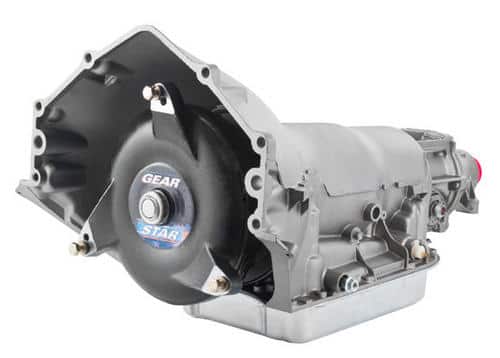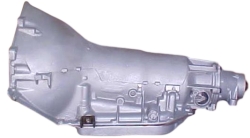The TH400 is an aluminum cased three speed automatic transmission that was produced by GM. It was introduced for the 1965 model year and made its debut in Cadillacs, and is respected for its durability and adaptability. The TH400 came in two wheel drive and four wheel drive vehicles, passenger cars and heavy duty trucks, as well as GM vehicles and those made by other manufacturers.
ATI's Turbo 400 Drag Racing Transmission. Now available with the award winning ATI T400 SFI Certified SuperCase. 2 and 3 speed versions available with many gear set ratios to choose from. ATI has T400 street rod and drag race transmssions for vehicles making 600 horsepower to 3,000 horsepower! Certified Transmission offers the following resource for those interested in knowing vehicle applications for the remanufactured 400 transmission. To view applications begin by selecting the vehicle manufacturer listed below. TH400 Transmission Specs, ID, and Common Problems The TH400 is an aluminum cased three speed automatic transmission that was produced by GM. It was introduced for the 1965 model year and made its debut in Cadillacs, and is respected for its durability and adaptability.

More than almost any transmission ever made, it has found its way into a wide variety of vehicles outside of the GM family. The TH400 has appeared in Jaguars, Hummers, Ferrari’s, and many more.
TH400 Specs
| Manufacturer: General Motors |
| Production: 1964 (for 65 model years) through 1990 |
| Type: 3 Speed Automatic |
| Gear Ratios: First- 2.48 Second- 1.48 Third- 1.00 Reverse- 2.00 |
| Input Shaft: 32 Spline |
| Torque Converter Lock: NO |
| Overdrive: NO |
| Case Length: 24 3/8” Different applications had different lengths due to different tail shafts/transfer cases. Use this diagram to help you. |
| Outer Case Material: Aluminum, fused with bellhousing |
| Controlled by Computer: No It’s controlled by a vacuum module and kickdown switch |
| Weight: Roughly 150 pounds with ATF |
3L80
In the early 90’s GM rebranded all of their transmissions, They created a standardized naming system across their product line, and changed the name of the TH400 to 3L80.. The 700R4 became the 4L60 and so on. There is no difference other than the name. 3L80 stands for three gears, longitudinal mount (rear wheel drive), and the 80 signifies that it can handle 8000 lbs. in gross vehicle weight(supposedly).

Note that unlike all the other GM transmissions of the time there was no E at the end of the nomenclature. This is because the TH400 was never designed to communicate with the CPU of the vehicle/The 3L80 was the last non overdrive transmission used by GM in regular production trucks and vans. It was eventually replaced by the 4L80E. It uses the B-O-P bellhousing bolt pattern which makes it compatible with nearly any GM engine. It also does not use a locking torque converter.
Th375 and Th475

There are were a few one of versions of the Turbo 400 as well. These are the TH375, and the TH475. The Th375 was manufactured for cars with low horespower engines in the 1970’s. It was modified to fit the TH350 driveshaft yolk. If you are looking to purchase a TH400 avoid it. It’ll have The TH475 was used in heavy duty trucks in the 1970’s, and can handle a lot of power.
TH400 Identification
If you were to line up every automatic transmission that GM ever produced, you’d be hard pressed to find one that is larger than the turbo 400. It is just huge. If it was lined up with a 200-4R, TH350, or 4L60E it would be easy to identify a TH400. It would be far and away the largest transmission there.

400 Transmission Rebuild Kit
Since it’s not very likely that you are going to run into a lineup of automatic transmissions being the biggest isn’t going to be very helpful.
There are 13 bolts on the pan underneath the transmission. If you count 13 you are almost home free, but the Th350 also has 13. Since these are the two most common GM automatic transmissions of the latter half of the last century it’s very important that you figure out which is which.
The TH400 uses an electronic kick-down mechanism, which means that there will be an electric plug on it. The TH350 uses a mechanical linkage that attaches to the carburetor. Th350 has the vacuum modulator in the back, and the TH400 keeps it on the side.

Using the pan bolt pattern is the easiest way to identify the TH400. Both the TH350 and TH400 have a similar look. They utilize a kick down cable, and they both use the same bellhousing bolt pattern. Identifying the Th400 is really as easy as knowing the differences between it and the TH350.
Also, take a look at the bolt pattern itself. The Th400 has a much more complex pan then the Th350. The Th350 is basically a square with a corner taken out of it. See for yourself. The TH400 on the other hand has 9 different angles on the the pan. It’s one of the more complex pans that GM made.
The Turbo 350 has a much simpler look. Here it is, Notice that it looks like a box with a slice taken out of the corner. That corner would be on the driver’s side of the vehicle.
Identifying Turbo 400 By the Tag
You’ll find the identification tag above the transmission pan on the drivers side. It is machined into the transmission in most cases. So, it’s really not really a tag, which can make it a bit more difficult to identify if the transmission is really greasy. Take some brake parts cleaner with you if you really want to get a good look at it.
Try using this guide to help you lock down what model number you may be looking at.
Common TH400 Problems
- Early Shift– One of the most common issues with the TH400 is that it’ll shift too early. This is almost always cause by the vacuum line that runs to the modulator from the intake manifold. While they came from the factory with hard lines, many people will swap them out for soft lines when doing a swap, since finding a hard line for the particular vehicle can be an issue.
- Late shift– The Th400 will often shift a little later than a person would like, espescially at the track. This is usually caused by its electric kick-down switch.
- General not shifting right– If you’ve checked that the kick down circuit is ok, and the vacuum line is too, than it may be time to look at the vacuum modulator itself. It’s more likely to have fluid in it than it is to have gone out itself.
Turbo 400 Transmission Front Pump
TH400 and Non-GM vechicles
Maybe the best compliment comes from your competition. And at least a dozen auto makers have paid GM to use the TH400 instead of creating a competitor for it. These include Toyota, Ferrari, Rolls-Royce, and Hummer. This is a true testament to its bulletproof reliability and ease of tuning.
The Turbo 400 has been used in Jeeps from the factory. Early model AMC Jeeps used an adapter plate to mate it with the GM bellhousing bolt pattern. Later, a specific TH400 was made just for Jeep. This version tilted the transmission about 4 degrees in order to better accommodate the transfer case. It has not been produced for quite a while and is considered pretty rare. The Turbo 400 is compatible with most Jeeps. However, the CJ5 has to narrow of a wheelbase to accommodate it. The specialty jeep TH400 case is 24 1/2 inches long.
When looking at a Jeep that came from the factory with the Turbo 400, it’ll be bolted to either the BW 13-39 or the Dana 20 transfer case. In the 1960’s some Jeeps came with Buick engines, so they used neither an adapter nor the Jeep specific transfer case. Some of the AMC specific adapters on these transmissions have been prone to failure.
